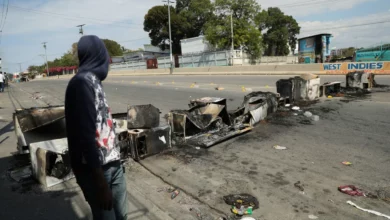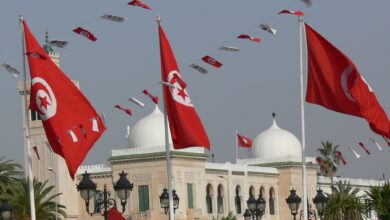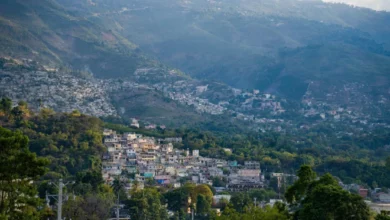London–An outbreak of violent unrest in Tunisia has punctured a taboo on challenging President Zine al-Abidine Ben Ali in public, a change that could weaken his tight grip on power.
A combination of deploying the military on the streets and concessions to protesters may allow the authorities to contain the violence, but in the longer-term they could struggle to dominate the country in the way they have done up to now.
"The protests will mark a watershed in the political life of the Ben Ali regime," said political risk consultancy firm Oxford Analytica. "The unrest will breathe new life into society and embolden popular calls for change."
What is still lacking though is any clarity about what form that change could take: Tunisia has a weak and divided opposition and no figure has emerged who could channel the unhappiness into concerted political action.
The real effects of the unrest, Ben Ali's opponents believe, could make themselves felt in 2014 when he must either step down or seek a change in the constitution to allow him to run for a sixth term in office.
Tunisia's government says it is committed to democracy and respects freedom of expression. It says too that Ben Ali, 74, is popular and credited with turning his country into one of the most stable and prosperous in the region.
"The Tunisian government is not at its end but it is building and listening to young people," Bechit Tekkari, a government minister, told Arabic news channel Al Jazeera.
For years the only place public dissent could be heard about Ben Ali's rule was in Tunisian diaspora communities abroad, the foreign media or in corners of the Internet.
People avoid speaking openly in public places in case an informer or plain clothes police officer is eavesdropping.
Local media heap lavish praise on the president and his wife, and opposition parties who are prepared to criticize the government do not have seats in the deferential parliament.
Copies of French newspapers delivered to Tunis often have pages missing where censors have removed articles that could irritate the government, residents say.
The protests, which broke out in December when an unemployed man set fire to himself in the town of Sidi Bouzid and have since claimed the lives of dozens, have not swept those restrictions away, but they have dented them.
As the unrest gathered momentum slogans relating to Ben Ali started appearing alongside those about unemployment and living conditions.
A witness in Sidi Bouzid told Reuters on Thursday that thousands of people has gathered for a new protest. "All the slogans are against Ben Ali," he said by telephone.
Amateur footage of a group of people burning a portrait of Ben Ali — posters with his image hang in every shop and public building and on billboards in the street — has been widely circulated on online social networks used by young Tunisians.
One local resident said he heard people speaking critically of Ben Ali in a cafe in the capital this week, something that would have been unthinkable before.
Posts on Twitter feeds used by people involved in the unrest show a growing focus on Ben Ali.
"Do not let Ben Ali flee," read one post in French, the language of the former colonial power still widely used in Tunisia. "I smell victory approaching, the end of the dictatorship … Take courage," said another.
Another change is that trade unionists, whose organizations have traditionally deferred to the authorities, have been involved in the protests.
"Ben Ali is definitely under pressure — more than he has been before," said Gala Riani, analyst with IHS Global Insight. "I think he and his government thought these protests would go away but they have intensified and spread."
Many Tunisians respect Ben Ali, but many also have grievances with him and members of his family, some of whom have prominent roles in business and public life.
The US ambassador to Tunisia at the time, Robert Godec, wrote about the president in a July 2009 cable published by the WikiLeaks website: "He and his regime have lost touch with the Tunisian people."
"Corruption in the inner circle is growing. Even average Tunisians are now keenly aware of it, and the chorus of complaints is rising," the cable said.
Tunisia's style of government, say some analysts, sits uneasily with the growing sophistication of its people. Tunisia has a large middle class, people are well-educated, and many have close ties to Europe.
Facebook users make up 18.6 percent of the population, according to Internet marketing consultancy socialbakers, a higher penetration than in Germany.
"In Tunisia, the educated middle class is exasperated. Hence the involvement of lawyers and academics in the protests," said Benjamin Stora, a leading French historian of the Maghreb region that includes Tunisia.
"This (the wave of unrest) looks like a real social movement to try to unlock the system."
Najib Chebbi is the only opposition politician Western diplomats view as a potential partner. The small party he founded boycotted the last presidential election, and plain clothes police sometimes surround its headquarters.
He said the unrest underlined the need for Tunisia to change direction and start preparing a road map for a transition of power in 2014.
"The promises made have been broken. We were promised political reforms and the transition to a democracy and we have had 20 years of dictatorship," Chebbi told Reuters.
"It's up to us the opposition and those in power to find a peaceful and progressive outcome to this crisis or else we will leave the country to hit a wall."




